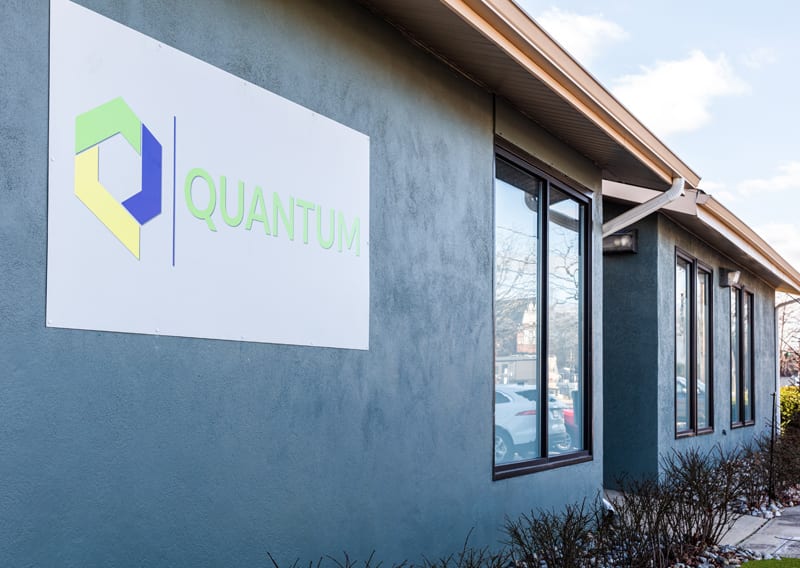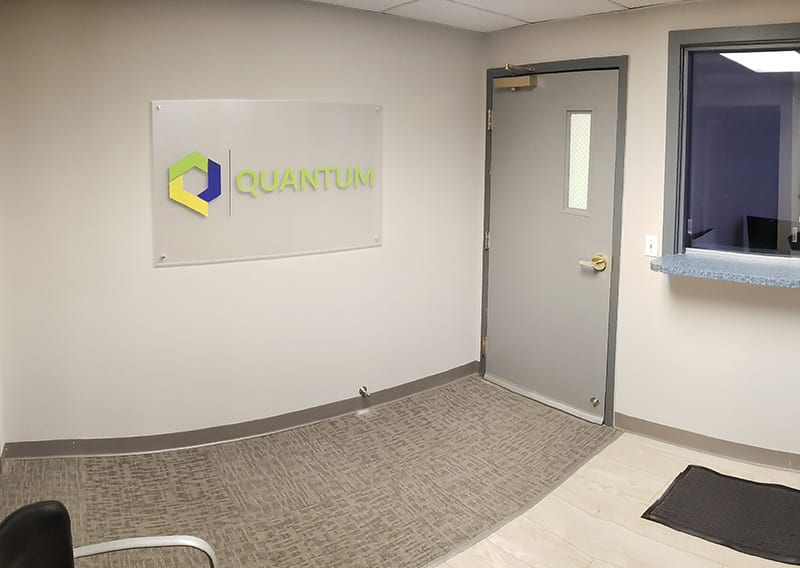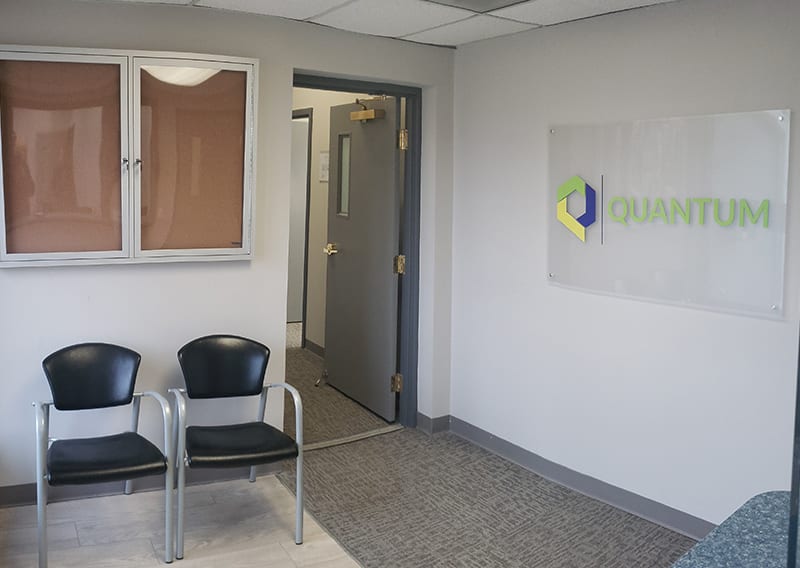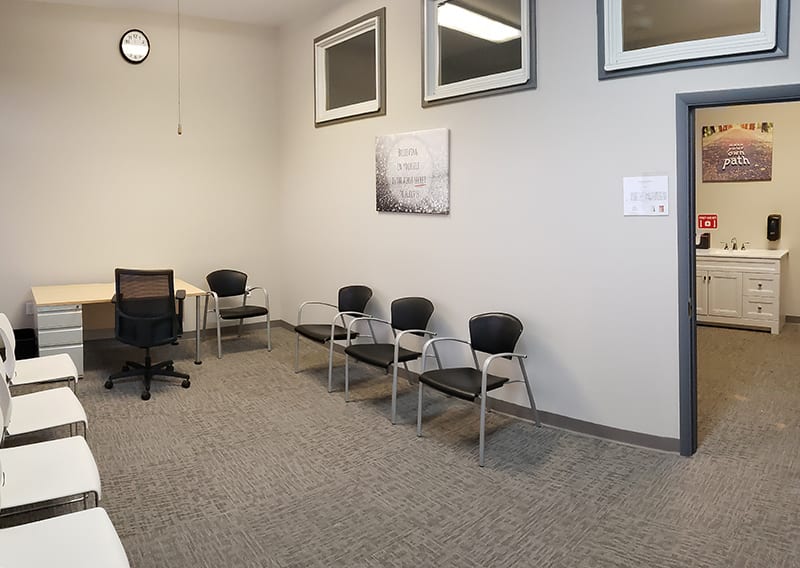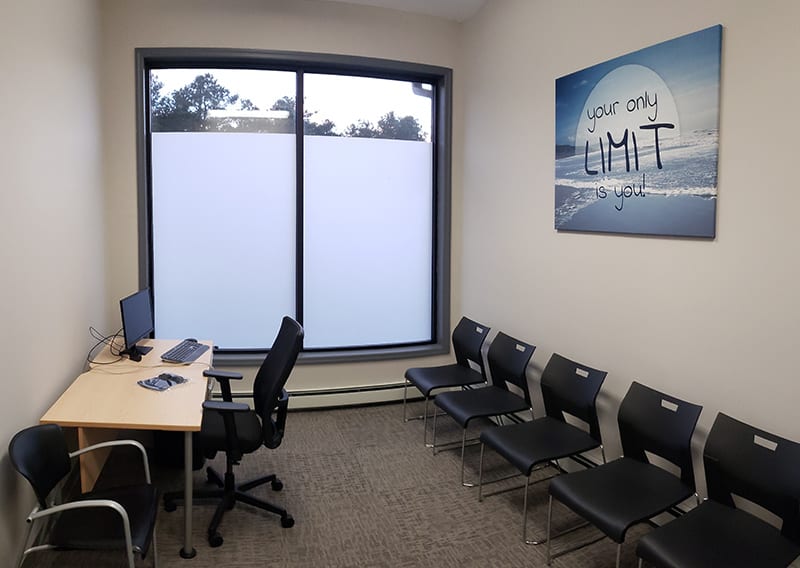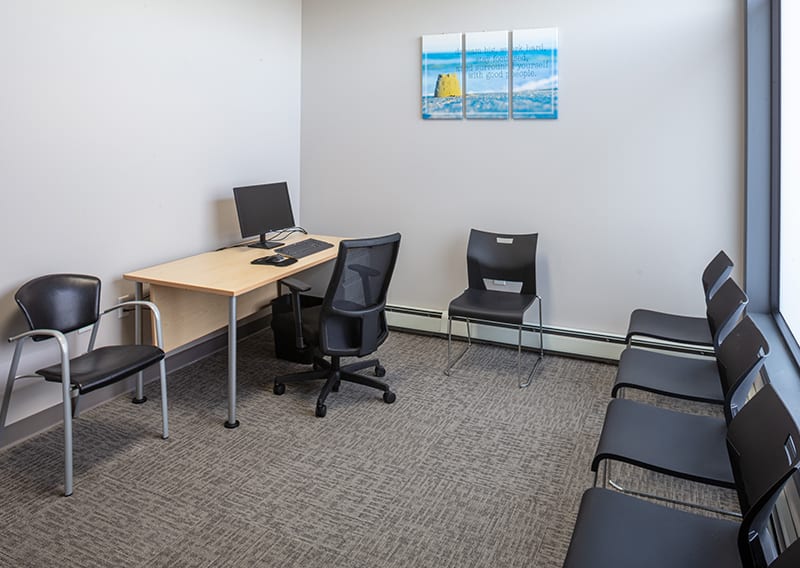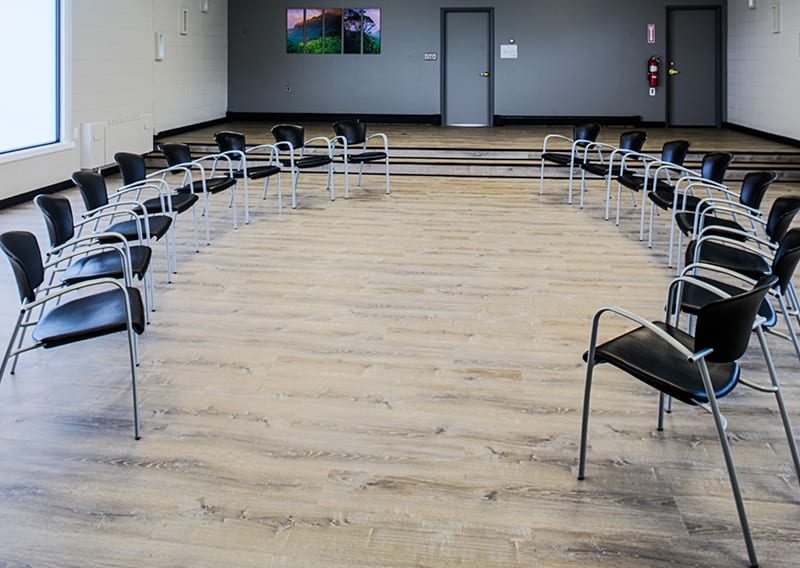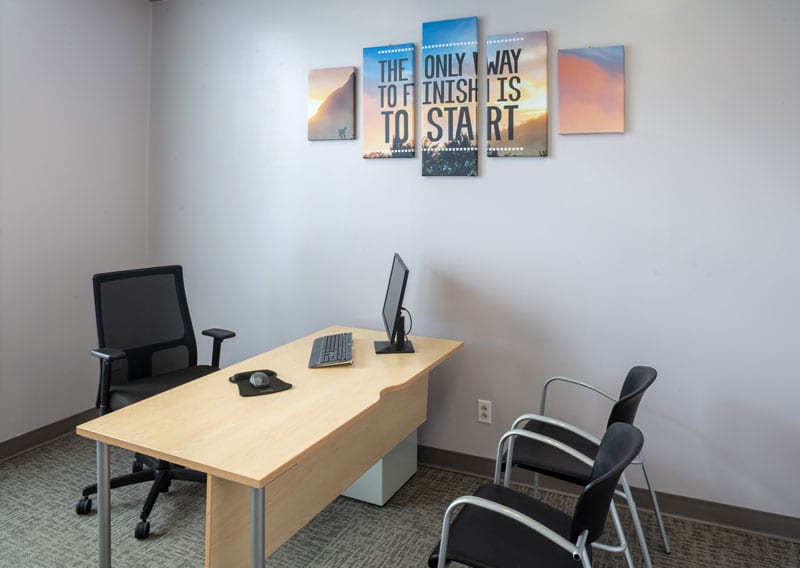Our facility is a warm, inviting, cozy, and secure environment that provides the perfect level of safety, comfort, and privacy as you receive treatment and get on your path to wellness. We’ve designed our space to allow for a low-stress environment where you can focus on your well-being.
Given the concerns of the COVID pandemic, we’re ensuring procedures are followed to create a clean environment for our patients, staff, and visitors. We’ve gone above and beyond CDC and New Jersey State guidance to design our cleaning and disinfecting protocol so that there is no question of the cleanliness and safety of our facility.
You’re here to get well and our priority is maintaining a safe, clean, peaceful, and welcoming environment for you to do just that.
To see our response to Covid-19, click here.
Photo Gallery
Click photos to enlarge
Are You Ready to Begin Your Journey to Recovery?
You could be completely covered. Verify Your Insurance Today.
The Quantum
Process Outpatient Rehab NJ
1. Make the Call
Contact our Quantum Team at
(609) 993 – 0733 to get started.
2. Complete
Your Intake
This streamlined process includes a series of questions and discussion of your unique needs and goals.
3. Get the Best Care Team Possible
After your intake, you’ll meet your Care Team, a group of amazing professionals dedicated to helping you make recovery reality.
4. On-Going Support
After you meet your Care Team, you’ll start to receive treatment based on a Care Plan that’s designed to help you achieve and sustain your recovery.
- What Is Alcohol Rehab Like?
- What To Expect During Rehab?
- How Long Is Alcohol Rehab?
- 30 Day Rehab
- 60 Day Rehab
- 90 Day Rehab
- Holistic Alcohol Rehab in Princeton
- Executive Alcohol Rehab in Princeton
- Alcohol Rehab Near Me
- Breathwork Therapy
- Cognitive Behavioral Therapy
- Dialectical Behavioral Therapy
- Family Systems Therapy
- Trauma-Informed Therapy
- Why Choose Quantum Behavioral Health For Residential Alcohol Rehab
What Is Alcohol Rehab Like?
Alcohol rehab can occur in a variety of settings depending on the exact needs of the individual. Alcohol use disorders can range from binge drinking on weekends and holidays to having to drink every day to get through normal activities. What this means when it comes to treatment plans is that they can vary greatly. Some individuals who have developed an alcohol dependency or alcohol addiction may need to take part in a medical detox program. Others can go straight to weekly individual therapy and reach their goals. There are a lot of factors that go into what types of treatment a person may need and our incredible staff makes sure they do a full analysis before someone begins a care plan with us.
What To Expect During Rehab?
From a high level perspective, substance abuse treatment in any setting will be divided into individual therapy and group drug and alcohol counseling sessions. Underneath those two umbrellas, there are many options. Individual therapy can include Cognitive Behavioral Therapy (CBT) or Dialectical Behavioral Therapy (DBT). Family therapy or Family Systems Therapy is a form of group session that involves people close to the patient. One of the reasons why individual therapy and group drug and alcohol counseling sessions exist is because different people open up regarding certain topics under varying conditions. Some people find group therapy very supportive and see all of the people around them walking the same path which gives them the confidence to talk about what they are thinking or feeling. Other individuals can only do the same thing in a one on one session. That is why at Quantum we develop unique treatment plans for all of our patients.
How Long Is Alcohol Rehab?
Alcohol rehab is not a race, well it is at least definitely not a sprint. It is more like a long hike in the woods, where the goal is to discover many things and to go at your own pace. Each individual client’s overall continuum of care could last from a few weeks, to many months, to over a year, all depending on many factors about themselves and their level of abuse or addiction. There are some portions of a treatment plan that have established time frames, like residential inpatient treatment that lasts 30, 60 or 90 days.
30 Day Rehab
30 day rehab is often referred to both in everyday society and pop culture simply as “rehab.” A 28 or 30 day inpatient rehab program for drug or alcohol abuse or addiction is very common. A 30 day stay in a recovery center allows a person to step away from many if not all of the people, places, and things that may have caused or contributed to their consumption of alcohol. Learning even for one month that life will go on without drinking can be just the inspiration a person needs to begin their addiction recovery.
60 Day Rehab
A lot of experts agree that the longer a person can stay in a residential treatment program the more likely they are to have a successful recovery. This has a good amount of merit as the more time someone takes developing their relapse prevention plan, along with other coping skills and life skills, the more prepared they are to face the everyday stresses test they will encounter once they have completed inpatient treatment. Many people can not take two months away from their responsibilities in life but anyone who can take part in a 60 or 90 day rehab program will most likely benefit greatly.
90 Day Rehab
Another benefit of a longer inpatient treatment program of 60 or 90 days is a patient’s ability to take advantage of more types of therapy. Standard individual therapy and group counseling sessions are excellent and help a lot of people, but there are many other options and these can be explored more fully during 60 or 90 day inpatient rehab. These include Breathwork Therapy, Cognitive Behavioral Therapy, Dialectical Behavioral Therapy, Family Systems Therapy, and Trauma-Informed Therapy. Other optional therapies are art therapy, music therapy, exercise therapy, yoga, meditation, and other holistic activities.
Holistic Alcohol Rehab in Princeton
More and more people have come to the understanding that drug abuse, drug addiction, alcohol abuse, and alcohol addiction can impact a person’s mind, body, and spirit. By combining holistic approaches to therapy in addition to traditional medical and counseling options, we believe we can help more people successfully begin their journey on the road to recovery. At Quantum we provide each client with the tailored support and the nurturing, healthy environment that will allow them to focus on all aspects of being well and staying well.
Executive Alcohol Rehab in Princeton
People from all walks of life struggle with abuse and addiction, including those who work in the boardroom and other upper echelons of organizations. It is important to provide alcohol rehab for as many individuals as possible and Executive Rehab allows top tier management individuals the flexibility to attend therapy and still take care of their responsibilities. In recent years, virtual therapy sessions have become more popular and this has added to the flexibility many rehab centers are able to offer to everyone, including executives. Some inpatient treatment programs that offer Executive Alcohol Rehab allow for the use of mobile devices like laptops, tablets, and smart phones at specific times or after the therapy day is over. This allows executives to stay in touch with people as needed, while going through their continuum of care.
Alcohol Rehab Near Me
Alcohol rehab is available almost everywhere. This includes meetings of Alcoholics Anonymous, which can be found everywhere from small towns across the U.S.A. to cruise ships sailing the seven seas. No matter whether you need inpatient treatment, outpatient treatment, medical detox, or other services, there are addiction resources near you. Do not hesitate to call us at Quantum to help you locate the services you need and the types of treatment that will help you begin your addiction recovery.
Breathwork Therapy
Breathwork therapy is a type of optional holistic treatment that can help a person heal their mind, body, and spirit. This type of therapy includes purposely changing your breathing patterns and being conscious of how each breath is affecting you holistically. The potential benefits are stress relief, relaxation, and self-awareness, which is why people often perform them to improve mental, physical, and spiritual well-being.
Cognitive Behavioral Therapy
Cognitive Behavioral Therapy, or CBT, is based on several core theories. Two of which are that psychological problems are based, in part, on faulty or unhelpful ways of thinking. Additionally, psychological problems are based, in part, on learned patterns of unhelpful behavior. What this allows therapists and their clients to do is to analyze those unhelpful ways of thinking and unhelpful behaviors and where they came from, as well as why they are the root cause of consuming alcohol or using drugs.
Dialectical Behavioral Therapy
Where CBT focuses on the thoughts that can lead to drinking or using drugs, Dialectical Behavioral Therapy, or DBT, concentrates on helping patients find ways to accept themselves, feel safe, and manage their emotions to help regulate potentially destructive or harmful behaviors. Some of the skills DBT teaches patients are to accept circumstances and make changes when necessary and to analyze behaviors and learn healthier patterns of responding.
Family Systems Therapy
Family Systems Therapy goes one step further than traditional family therapy in that it deeply explores the connection between someone’s alcohol abuse or drug abuse and the dynamic within their circle of relatives. Family Systems Therapy encourages as many family members as possible to take part so that a therapist can have as much data to analyze as possible.
Trauma-Informed Therapy
Trauma-informed Therapy attempts to locate the root cause, often from a person’s youth, that may have caused them to start drinking or using. By facing an early life trauma and discussing the effects it had, patients are able to move forward and not lean on drugs or alcohol to continue to deal with what happened in the past.
Why Choose Quantum Behavioral Health For Residential Alcohol Rehab
At Quantum we take a mental, physical, and environmental approach to helping each person reach their goal of rebalancing and restoration. By doing so we believe we can help the most people possible find their way to a happier, healthier lifestyle.
